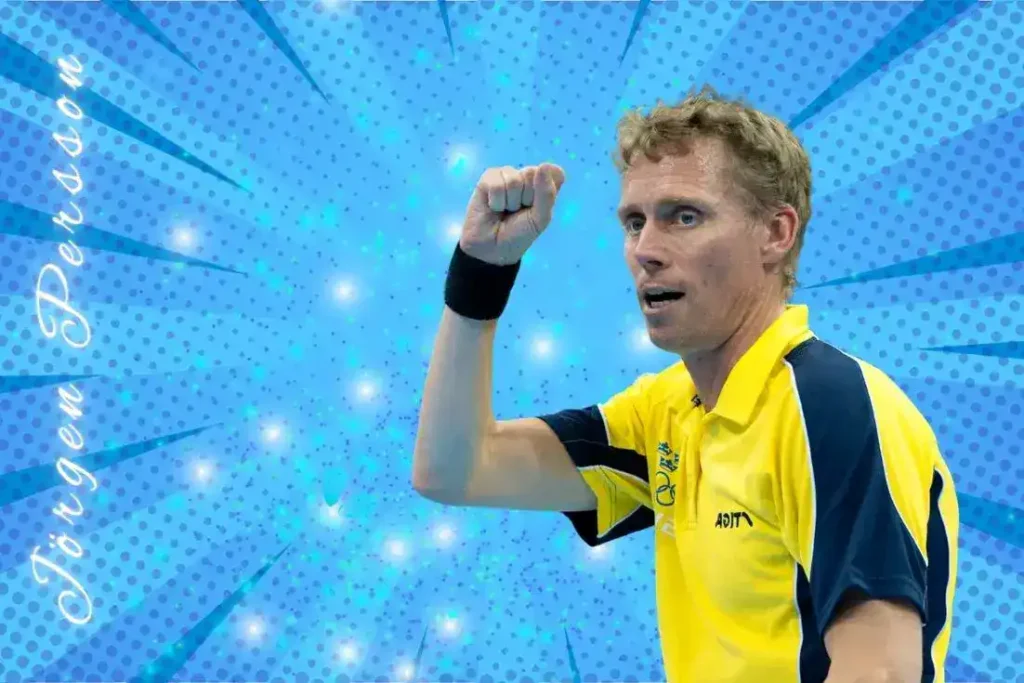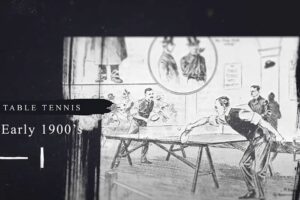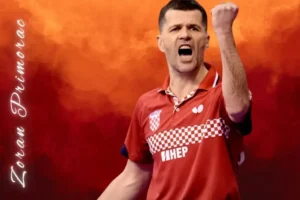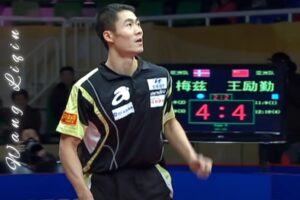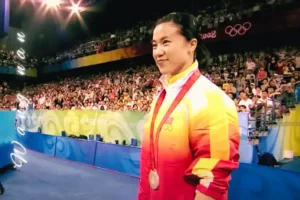Jörgen Persson is a name that resonates deeply within the world of table tennis. As one of Sweden’s most celebrated athletes, Persson’s career is a shining example of perseverance, skill, and a deep-rooted passion for the sport.
Born in Halmstad, Sweden, Persson rose through the ranks to become a world champion, competing at the highest levels for over three decades. His journey from a young talent to a seasoned champion is filled with memorable matches, historic victories, and a lasting influence on the sport he loves.
Persson’s career isn’t just a story of personal triumph; it’s a tale of national pride and international respect. Representing Sweden, a country that became a dominant force in table tennis during the late 20th century, Persson, alongside his teammates, challenged the supremacy of the Chinese, who had long been the gold standard in the sport.
His legacy is one of consistency, mental toughness, and an unwavering commitment to excellence, making him a true legend in the world of table tennis.
Profile of Jörgen Persson
Personal Details
Here’s a closer look at the man behind the legend:
- Full Name: Jörgen Persson
- Date of Birth: April 22, 1966
- Place of Birth: Halmstad, Sweden
- Nationality: Swedish
- Height: 6’0″ (183 cm)
- Weight: Approximately 78 kg (172 lbs)
- Playing Style: Right-handed, shakehand grip
- Highest Ranking: World No. 1 (during his peak years in the late 1980s and early 1990s)
- Coaches: Ulf “Tickan” Carlsson, among others
- Education: Details are not publicly documented, focusing on his early dedication to table tennis from a young age
Career Highlights and Achievements
Jörgen Persson’s career is a testament to sustained excellence at the highest levels of competitive table tennis. He began making waves in the sport as a teenager, quickly establishing himself as a formidable player on the international stage. Throughout his career, Persson’s achievements have been both numerous and significant, reflecting his skill, strategic mind, and competitive spirit.
Key Achievements:
- World Champion: In 1989, Persson won the Men’s Singles title at the World Table Tennis Championships held in Dortmund, Germany. This victory was a significant milestone, not only for Persson personally but also for Swedish table tennis, which was at its zenith during this period. Persson’s triumph in the singles category highlighted his ability to compete and win against the very best in the world.
- Team Success: Persson was also a crucial member of the Swedish national team, which won the World Team Championships in 1991, 1993, and 2000. These victories were particularly notable because they came at a time when China was the dominant force in the sport. Sweden’s ability to overcome such a strong opponent was a testament to the skill and teamwork of players like Persson.
- European Championships: Persson’s dominance was not limited to the global stage; he also enjoyed considerable success in Europe. He won multiple titles at the European Table Tennis Championships, further cementing his legacy as one of the continent’s greatest players.
- Olympic Appearances: Jörgen Persson’s Olympic record is particularly remarkable. He represented Sweden in seven consecutive Olympic Games from 1988 to 2012, an achievement that underscores his longevity and consistency at the highest level of the sport. While he didn’t win an Olympic medal, his performances were always strong, and he remains one of the most respected figures in the sport’s Olympic history.
Complete List of Wins and Tournaments
| Year | Tournament | Event | Result | Opponent | Location |
|---|---|---|---|---|---|
| 1989 | World Table Tennis Championships | Men’s Singles | Gold | Jan-Ove Waldner | Dortmund, Germany |
| 1991 | World Table Tennis Championships | Men’s Team | Gold | China | Chiba, Japan |
| 1995 | World Table Tennis Championships | Men’s Team | Gold | China | Tianjin, China |
| 1986 | European Table Tennis Championships | Men’s Singles | Gold | Tibor Klampár | Prague, Czechoslovakia |
| 1996 | European Table Tennis Championships | Men’s Singles | Gold | Vladimir Samsonov | Bratislava, Slovakia |
| Various | Swedish National Championships | Men’s Singles/Doubles | Multiple | Various | Sweden |
| Various | ITTF Pro Tour | Various | Multiple | Various | Global |
Playing Style and Techniques
Jörgen Persson was known for his classical all-round style of play. His technique was rooted in the fundamentals of table tennis, with a focus on precision, control, and strategic placement.
- Forehand Drive: Persson’s forehand was one of his most reliable weapons. He utilized a shakehand grip, which allowed him to execute powerful and accurate forehand drives. His ability to switch from defense to offense with this stroke was a hallmark of his game.
- Backhand Block: His backhand block was exceptionally well-timed, often neutralizing the opponent’s spin and speed. Persson’s block was not just defensive; he could also apply pressure, forcing errors from his opponents.
- Serve and Return: Persson’s serves were deceptive, with subtle variations in spin and placement. He mastered the art of the short serve, often setting up his forehand or backhand attacks. His return game was equally impressive, with a deep understanding of spin manipulation, allowing him to dictate the pace of the rallies.
- Footwork: His footwork was efficient and smooth, enabling him to cover the table with ease. Unlike some players who rely on speed alone, Persson’s movement was calculated, allowing him to maintain a balanced position for both attack and defense.
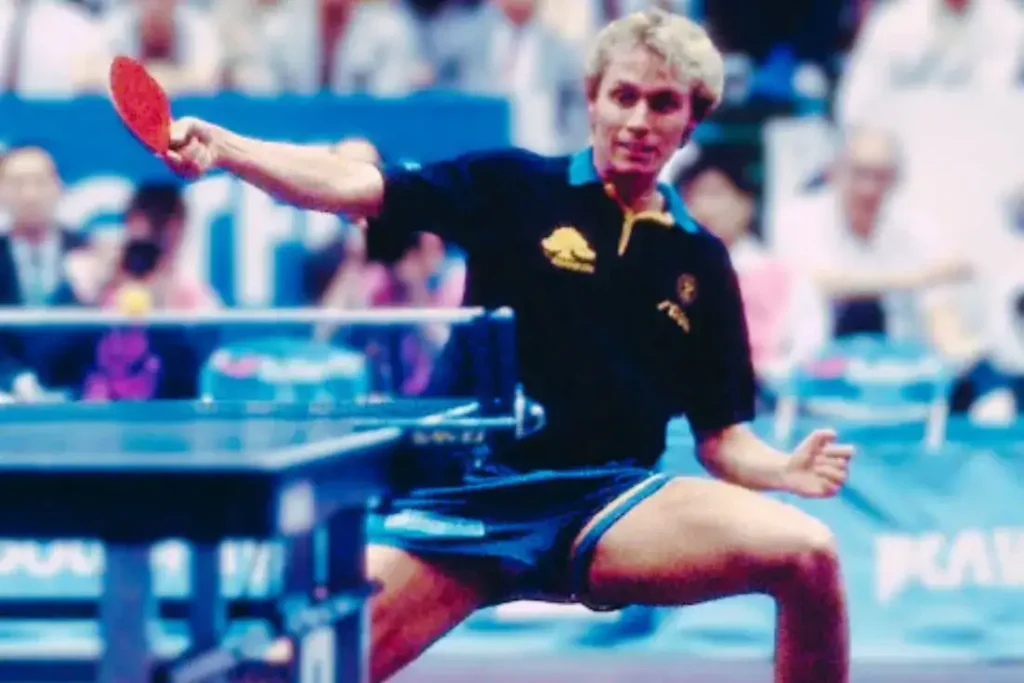
Historical Impact
Jörgen Persson’s impact on the sport of table tennis is profound. His victory in the 1989 World Championships is often cited as a turning point in the history of European table tennis, as it marked the beginning of Sweden’s dominance in a sport traditionally ruled by China. Persson’s role in Sweden’s golden era of table tennis, alongside legends like Jan-Ove Waldner and Mikael Appelgren, helped elevate the sport’s popularity in Europe and inspired a new generation of players.
Persson’s longevity in the sport is also noteworthy. Competing at the highest level for over 30 years, he exemplified the values of dedication, discipline, and sportsmanship. His influence extends beyond his playing days, as he continues to be involved in table tennis, mentoring younger players and contributing to the sport’s development.
Training Regimens
Jörgen Persson’s training regimen was as meticulous as his playing style. His approach to training emphasized consistency, endurance, and mental preparation.
- Daily Practice: Persson was known to practice for several hours a day, focusing on all aspects of his game, from footwork to stroke precision. His practice sessions were often intense, designed to simulate match conditions as closely as possible.
- Physical Conditioning: Off the table, Persson’s training included a significant amount of physical conditioning. This included running, weight training, and flexibility exercises. His fitness level was a key factor in his ability to compete at a high level well into his 40s.
- Mental Preparation: Mental toughness was one of Persson’s strengths. He practiced visualization techniques, focusing on match scenarios and how to respond to different situations. This mental preparation was crucial in high-pressure matches, where his calm demeanor often gave him an edge over his opponents.
- Diet and Nutrition: While not as widely publicized, Persson’s diet was likely tailored to support his training demands, focusing on balanced nutrition to maintain energy levels and support recovery.
Personal Anecdotes and Stories
Jörgen Persson’s career is filled with memorable moments and personal stories that reveal the person behind the athlete.
- The 1989 World Championship Final: One of the most iconic moments in Persson’s career was his victory over Jan-Ove Waldner in the 1989 World Championship final. The match was a showcase of skill, strategy, and sportsmanship, with Persson ultimately emerging victorious. Despite being fierce competitors on the table, Persson and Waldner maintained a deep respect for each other, a relationship that has endured over the years.
- Friendship with Waldner: Persson’s friendship with Waldner is well-known in the table tennis community. Despite their rivalry, the two have always supported each other, both on and off the table. This camaraderie was evident in team events, where their combined strength often led Sweden to victory.
- A Mentor to Younger Players: After retiring from competitive play, Persson took on the role of a mentor, sharing his knowledge and experience with the next generation of Swedish players. His insights into the game, particularly his understanding of the mental aspects of competition, have been invaluable to many aspiring players.
Interviews and Quotes
Over the years, Jörgen Persson has provided invaluable insights into the world of table tennis through his interviews and public statements. He often emphasized the importance of mental strength, noting that “the game of table tennis is as much mental as it is physical. The ability to stay focused, adapt, and remain calm under pressure is what separates the greats from the rest.”
His remarkable career longevity was another topic Persson frequently discussed, attributing it not just to physical fitness but to his enduring passion for the sport: “It’s not just about physical fitness. It’s about keeping the passion alive. I love this sport, and that love has kept me going all these years.”
Additionally, Persson reflected on his famous rivalry with fellow Swedish legend Jan-Ove Waldner, highlighting the unique dynamic between them: “Competing against Jan was always intense, but it was that rivalry that pushed both of us to reach new heights.” These reflections offer a glimpse into the mindset of one of table tennis’s greatest players and his approach to both competition and life.
Comparative Analyses
When comparing Jörgen Persson to other table tennis greats, several factors stand out:
- Consistency: Persson’s ability to perform at a high level for over three decades is matched by few. While players like Jan-Ove Waldner or Ma Lin may have had higher peaks, Persson’s sustained excellence is remarkable.
- Playing Style: Compared to his contemporaries, Persson’s style was less flamboyant but more methodical. He relied on precision and strategic play rather than sheer power or speed, which allowed him to remain competitive against a wide range of opponents.
- Legacy: Persson’s legacy is defined not only by his achievements but also by his contributions to the sport after his playing career. His involvement in coaching and mentorship has ensured that his impact on table tennis will be felt for years to come.
Evolution of the Game
Jörgen Persson’s career spanned a period of significant evolution in table tennis. During his early years, the sport was dominated by defensive styles and long rallies. However, as the game progressed, there was a shift towards more aggressive, fast-paced play, influenced by advancements in racket technology and changes in ITTF regulations, such as the introduction of the 40mm ball in 2000.
Persson adapted to these changes with remarkable ease. His ability to modify his technique and strategy in response to the evolving game is a testament to his versatility and deep understanding of table tennis. This adaptability is one of the reasons he was able to compete successfully across different eras of the sport.
Fun Facts and Trivia
- Longest Career Span: Persson’s career at the top level of table tennis lasted over 30 years, making him one of the longest-serving players in the history of the sport.
- First Coach: Persson’s first coach was the legendary Stellan Bengtsson, himself a former World Champion. Bengtsson’s influence on Persson’s game was profound, particularly in terms of his tactical approach.
- Olympic Torchbearer: In 1992, Persson had the honor of being an Olympic torchbearer for the Barcelona Games, highlighting his status as one of Sweden’s most respected athletes.
- Nickname: Persson was often referred to as “The Gentleman of Table Tennis” due to his calm demeanor and sportsmanlike conduct both on and off the table.
Beyond His Career
After retiring from competitive play, Jörgen Persson remained deeply involved in table tennis. He took on coaching roles, working with the Swedish national team and mentoring younger players. His insights into the game have been instrumental in shaping the next generation of Swedish table tennis stars.
Persson has also been active in promoting the sport globally, participating in various exhibitions and charity events. His contributions to the sport have been recognized with numerous awards, including induction into the ITTF Hall of Fame.
In addition to his work in table tennis, Persson has also explored business ventures, leveraging his experience and reputation to build successful enterprises in Sweden.
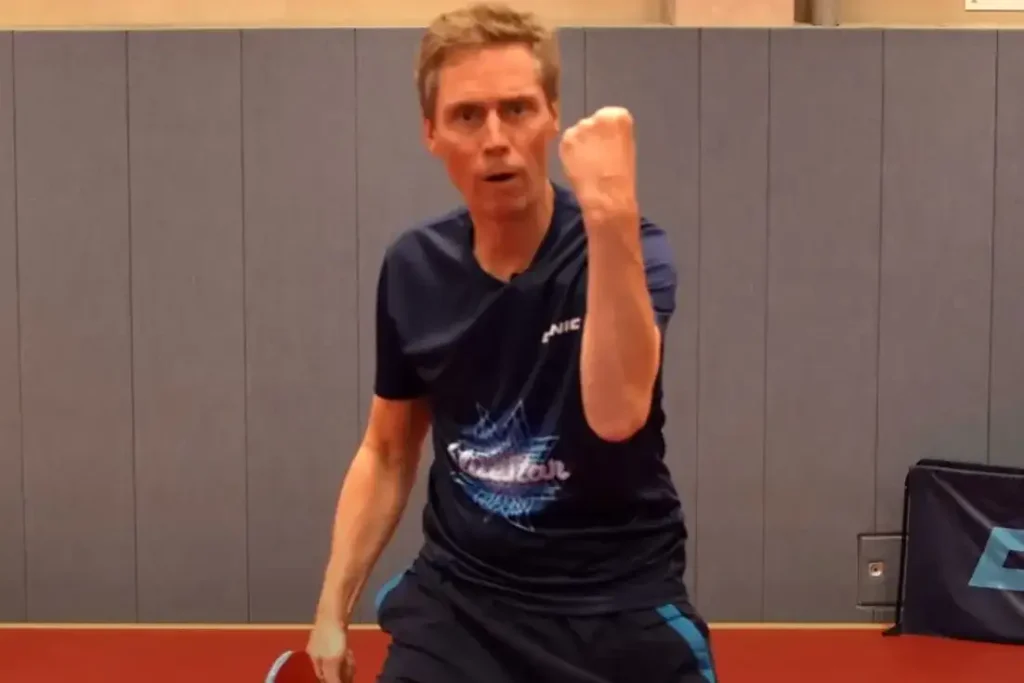
FAQs
Q. Who is Jörgen Persson?
Ans: Jörgen Persson is a renowned Swedish table tennis player known for his exceptional skills and significant contributions to the sport. He has won multiple international titles, including the World and European Championships, and is celebrated for his strategic play and longevity in the sport.
Q. What are Jörgen Persson’s most notable achievements?
Ans: Persson’s notable achievements include winning the 1989 World Championships in men’s singles, multiple European Championship titles, and contributing to Sweden’s victories in the World Team Championships. He is also recognized for his participation in seven consecutive Olympic Games.
Q. What playing style does Jörgen Persson use?
Ans: Persson is known for his right-handed shakehand grip and powerful backhand punch. His playing style features a strong topspin game and strategic versatility, allowing him to excel in both offensive and defensive situations.
Q. What are some of Jörgen Persson’s career highlights?
Ans: Some of his career highlights include winning the 1989 World Championships, multiple European Championship titles, and being a key player in Sweden’s World Team Championship victories in 1991, 1993, and 2000.
Conclusion
Jörgen Persson’s legacy in table tennis is not just defined by his numerous titles and accolades but by his enduring influence on the sport. His journey from a young prodigy in Halmstad to a global icon is a story of passion, perseverance, and excellence.
Whether through his precise playing style, his contributions as a coach and mentor, or his role in popularizing table tennis in Sweden and beyond, Persson’s impact on the sport is immeasurable. His career serves as an inspiration to aspiring players and a testament to what can be achieved through dedication and hard work.
